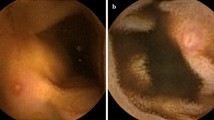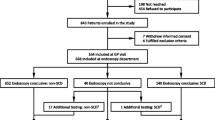Abstract
Purpose
The immunochemical fecal occult blood test (iFOBT) is a useful method to screen for lower gastrointestinal (GI) bleeding-related lesions. However, few studies have investigated the diagnostic utility of iFOBT in chronic kidney disease (CKD).
Methods
We included 691 patients with nondialysis-dependent CKD stages 2–5 or those receiving dialysis. Bleeding-related lower GI lesions were identified by colonoscopy, and the diagnostic utility of iFOBT was evaluated.
Results
Bleeding-related lower GI lesions were found in 9.2 % of 491 patients with CKD stage 2, 17.8 % of 107 patients with CKD stage 3/4, and 25.8 % of 93 patients with CKD stage 5/dialysis (p < 0.001). Compared with CKD stage 2, CKD stage 5/dialysis was independently associated with a 2.80-fold risk for bleeding-related lesions (p = 0.019). The iFOBT was positive in 92 (13.3 %) patients and the area under the receiver operating curve (AUC) for a bleeding-related lesion was 0.64 (p < 0.001). The sensitivity of iFOBT increased as the CKD stage worsened (20.0 vs 52.6 vs 58.3 %; p = 0.002). However, the specificity to detect bleeding-related lesions decreased with the severity of CKD stage (94.6 vs. 78.4 vs. 76.8 %; p < 0.001). The AUC of iFOBT to detect adenoma or carcinoma was 0.54 (p = 0.046), and a similar pattern of sensitivity and specificity was observed between different CKD stages.
Conclusions
The prevalence of bleeding-related lower GI lesions and the sensitivity of iFOBT to detect these GI lesions increased in advanced CKD. However, iFOBT should be used cautiously in these patients because its specificity decreased.


Similar content being viewed by others
References
Shirazian S, Radhakrishnan J (2010) Gastrointestinal disorders and renal failure: exploring the connection. Nat Rev Nephrol 6:480–492
Wasse H, Gillen DL, Ball AM, Kestenbaum BR, Seliqer SL, Sherrard D, Stehman-Breen CO (2003) Risk factors for upper gastrointestinal bleeding among end-stage renal disease patients. Kidney Int 64:1455–1461
Song YM, Yoon HE, Choi YA, Kim EO, Lee SJ, Chang YK, Kim SY, Yang CW, Hwang HS (2013) Use of blood tests to predict upper gastrointestinal lesions in patients with chronic kidney disease. J Investig Med 61:1115–1120
Wong G, Hayen A, Chapman JR, Webster AC, Wang JJ, Mitchell P, Craig JC (2009) Association of CKD and cancer risk in older people. J Am Soc Nephrol 20:1341–1350
Wu MY, Chang TC, Chao TY, Huang MT, Lin HW (2013) Risk of colorectal cancer in chronic kidney disease: a matched cohort study based on administrative data. Ann Surg Oncol 20(12):3885–3891
Saeed F, Aqrawal N, Greenberg E, Holley JL (2011) Lower gastrointestinal bleeding in chronic hemodialysis patients. Int J Nephrol 2011:272535
Bini EJ, Kinkhabwala A, Goldfarb DS (2006) Predictive value of a positive fecal occult blood test increases as the severity of CKD worsens. Am J Kidney Dis 48:580–586
Kumaravel V, Hayden SP, Hall GS, Burke CA (2011) New fecal occult blood tests may improve adherence and mortality rates. Cleve Clin J Med 78:515–520
Viana Freitas BR, Kibune Naqasako C, Pavan CR, Silva Lorena SL, Guerrazzi F, Saddy Rodriques Coy C, Ayrizono Mde L, Mesquita MA (2013) Immunochemical fecal occult blood test for detection of advanced colonic adenomas and colorectal cancer: comparison with colonoscopy results. Gastroenterol Res Pract 2013:384561
Hol L, Wilschut JA, van Ballegooijen M, Van der Valk H, Reijerink JC, Van der Toqt AC, Kuipers EJ, Habbema JD, Van Leedram ME (2009) Screening for colorectal cancer: random comparison of guaiac and immunochemical faecal occult blood testing at different cut-off levels. Br J Cancer 100:1103–1110
Allison JE, Sakoda LC, Levin TR, Tucker JP, Tekawa IS, Cuff T, Pauly MP, Shlaqer L, Palitz AM, Zhao WK, Schwartz JS, Ransohoff DF, Selby JV (2007) Screening for colorectal neoplasms with new fecal occult blood tests: update on performance characteristics. J Natl Cancer Inst 99:1462–1470
Poggio ED, Wang X, Greene T, Van Lente F, Hall PM (2005) Performance of the modification of diet in renal disease and Cockcroft-Gault equations in the estimation of GFR in health and in chronic kidney disease. J Am Soc Nephrol 16:459–466
Foundation NK (2002) K/DOQI clinical practice guidelines for chronic kidney disease: evaluation, classification, and stratification. Am J Kidney Dis 39:S1–S266
Rockey DC, Koch J, Cello JP, Sanders LL, McQuaid K (1998) Relative frequency of upper gastrointestinal and colonic lesions in patients with positive fecal occult-blood tests. N Engl J Med 339:153–159
Hwang HS, Song YM, Kim EO, Yoon HE, Chung SJ, Lee SJ, Chang YK, Yang CW, Chang YS, Kim SY (2012) Decisive indicator for gastrointestinal workup in anemic patients with nondialysis chronic kidney disease. Int J Med Sci 9:634–641
Green BT, Rockey DC (2004) Gastrointestinal endoscopic evaluation of premenopausal women with iron deficiency anemia. J Clin Gastroenterol 38:104–109
Majid S, Salih M, Wasaya R, Jafri W (2008) Predictors of gastrointestinal lesions on endoscopy in iron deficiency anemia without gastrointestinal symptoms. BMC Gastroenterol 9:52
KDOQI; National Kidney Foundation (2006) KDOQI Clinical Practice Guidelines and Clinical Practice Recommendations for Anemia in Chronic Kidney Disease. Am J Kidney Dis 47:S11–S145
Babitt JL, Lin HY (2012) Mechanism of anemia in CKD. J Am Soc Nephrol 23:1631–1634
Ito T, Tanaka I, Kadoya T, Kimura M, Ooshiro T, Ooishi K, Tanaka J, Yorioka N (1999) Screening for gastroenterological malignancies in new and maintenance dialysis patients. J Gastroenterol 34:35–40
Maisonneuve P, Agodoa L, Gellert R, Stewart JH, Buccianti G, Lowenfels AB, Wolfe RA, Jones E, Disney AP, Briqqs D, McCredie M, Boyle P (1999) Cancer in patients on dialysis for end-stage renal disease: an international collaborative study. Lancet 354:93–99
Fedirko V, Bostick RM, Goodman M, Flanders WD, Gross MD (2010) Blood 25-hydroxyvitamin D3 concentrations and incident sporadic colorectal adenoma risk: a pooled case-control study. Am J Epidemiol 172:489–500
Bilinski C, Burleson J, Forouhar F (2012) Inflammation associated with neoplastic colonic polyps. Ann Clin Lab Sci 42:266–270
Winawer SJ, Fletcher RH, Miller L, Godlee F, Stolar MH, Mulrow CD, Woolf SH, Glick SN, Ganiats TG, Bond JH, Rosen L, Zapka JG, Olsen SJ, Giardiello FM, Sisk JE, Van Antwerp R, Brown-Davis C, Marciniak DA, Mayer RJ (1997) Colorectal cancer screening: clinical guidelines and rationale. Gastroenterology 112:594–642
Escolar G, Díaz-Ricart M, Cases A (2005) Uremic platelet dysfunction: past and present. Curr Hematol Rep 4:359–367
Boccardo P, Remuzzi G, Galbusera M (2004) Platelet dysfunction in renal failure. Semin Thromb Hemost 30:579–589
Brenner H, Tao S, Haug U (2010) Low-dose aspirin use and performance of immunochemical fecal occult blood tests. JAMA 304:2513–2520
Acknowledgments
This research was supported by the Basic Science Research Program through the National Research Foundation of Korea (NRF) funded by the Ministry of Education, Science and Technology (2012R1A1A1009690).
Conflict of interest
The authors declare that they have no conflicting interests and no financial disclosures.
Author information
Authors and Affiliations
Corresponding author
Rights and permissions
About this article
Cite this article
Choi, Y.A., Yoo, S.H., Song, Y.M. et al. Diagnostic utility of immunochemical fecal occult blood tests to detect lower gastrointestinal lesions in patients with chronic kidney disease. Int J Colorectal Dis 30, 919–925 (2015). https://doi.org/10.1007/s00384-015-2200-3
Accepted:
Published:
Issue Date:
DOI: https://doi.org/10.1007/s00384-015-2200-3




